Best Ways To Boost Trichome Production
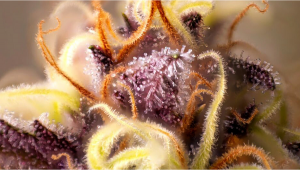
- 1. Trichome stages
- 2. Trichome functions
- 3. Good lights
- 4. Adjusting the environment for each stage
- 5. Plant training
- 6. Plant supplements
- 7. Genetics
- 8. Complete darkness before harvest
- 9. Drought stress
- 10. In conclusion
There isn't a magic formula to increase the trichome production, to achieve this you need a combination of different elements. Things like genetics, an optimal growing environment, adequate full-spectrum lights, and good quality nutrients at the right time will result in more resinous buds. If you want to get more trichomes then you should do what you need to end up increasing trichome production. Boosting trichomes is an improvement that can be made when your growing environment is not optimal. If you’re growing in a good environment, your cannabis seeds will be able to grow to its maximum, and in this case, it will depend solely on genetics.
1. Trichome Stages
It doesn’t matter if you’re having trouble increasing trichome production or if your plant is super frosty; All cannabis trichomes go through several cannabis trichome stages, they are:
- Clear:
- Cloudy or Milky and;
- Amber.
Clear Trichomes
“Young” trichomes are clear because they’re not filled with cannabinoids and terpenes yet. This means that they have not reached their full potential and the high won’t be as potent if you harvest at this stage.
Cloudy Trichomes
As your cannabis plant grows, cannabis plants produce more of the chemical compounds mentioned before, so the trichomes start to turn cloudy or milky. When the majority of the trichomes are cloudy it’s a sign that they’re completely or almost completely filled with cannabinoids and terpenes.
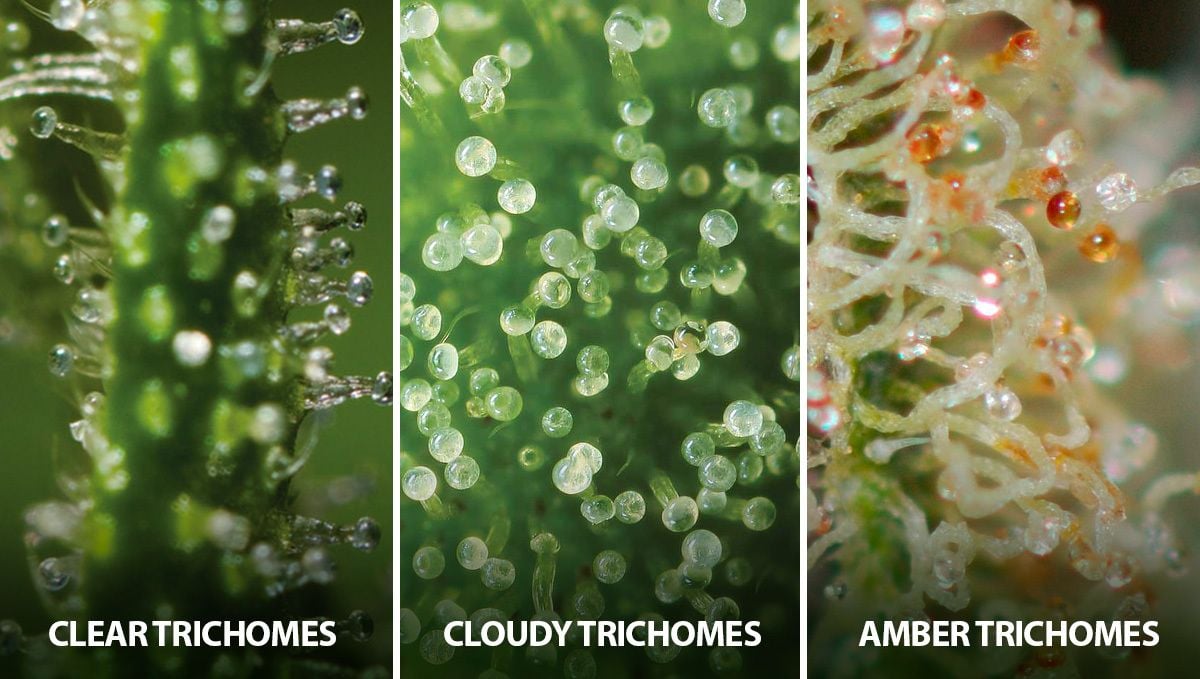
This means they’re at their peak potency and it’s when most growers prefer to harvest their cannabis plants due to the strong psychoactive effect.
Amber Trichomes
Due to being exposed to oxygen, heat, and light, trichomes will oxidize, which causes them to start turning amber. This happens because cannabinoids turn into CBN when exposed to the environment. Due to containing more CBN, amber trichomes provide a more corporal high so if you’re not looking for this type of effect it’s essential you harvest when the majority of the trichomes are cloudy.
2. Trichome Functions
What exactly are cannabis trichomes? The answer to this question determines exactly why cannabis growers are so interested in boosting their numbers. Many different plant species possess trichomes. Some of them use these structures to produce secondary metabolites to assist in plant survival. Others develop as sharp hairs that help to keep predators at bay.
Cannabis plants produce a variety of glandular trichomes. They fall into two categories: Secretory and non-secretory. The former are essentially miniature chemical factories that churn out cannabinoid acids (the precursors to cannabinoids such as THC and CBD) and terpenes (the aromatic molecules that give each strain its distinctive taste and aroma.
There are three major forms of glandular trichomes, these include:
Bulbous trichomes
These tiny blob-shaped structures are the smallest of the resin-producing trichomes found on cannabis leaves and flowers. They feature a small stalk with a head on top.
Capitate-sessile trichomes
Although larger than bulbous trichomes, capitate-sessile trichomes are still invisible to the human eye (without a microscope). They produce a lesser quantity of cannabinoid acids and certain terpenes than their larger counterparts. They possess a short stalk with a large spherical head on top.
Capitate-stalked trichomes
These are the largest form of cannabis trichomes and they produce the most cannabinoids and terpenes, particularly monoterpenes such as limonene and pinene. They feature a long stalk with a large bulbous head on top. Researchers believe that they are a more developed form of capitate-sessile trichomes.
So, how exactly do capitate-stalked trichomes produce their valuable secondary metabolites? Well, they manufacture them in 12–16 secretory discs found in the trichome head. From here, they store them in clear subcuticular cavities just above the disc cells. Of course, trichomes don’t produce cannabinoids and terpenes for the enjoyment of humans. Rather, they create them to defend themselves from predators and UV rays.
Recent research has also revealed that trichomes “farm” bacteria. These microbes exist within trichomes where they fix nitrogen from the atmosphere that is then used by cannabis plants. In return, trichome cells keep the bacteria alive by giving them sugars. They also use terpenes and cannabinoids as antioxidants to scavenge free radicals that protect the beneficial bacteria. There you have it. Cannabis growers want to increase the trichome count of their plants so that they produce more cannabinoid acids and terpenes. Plus, trichomes house bacteria that give plants nitrogen—a vital nutrient involved in protein synthesis.
3. Good Lights
Proper lighting is the most effective way to increase trichome production. As you may know, cannabis produces trichomes to protect the plant from UV rays, this means the more light and more spectrums you provide your plant, the more resin it will produce.
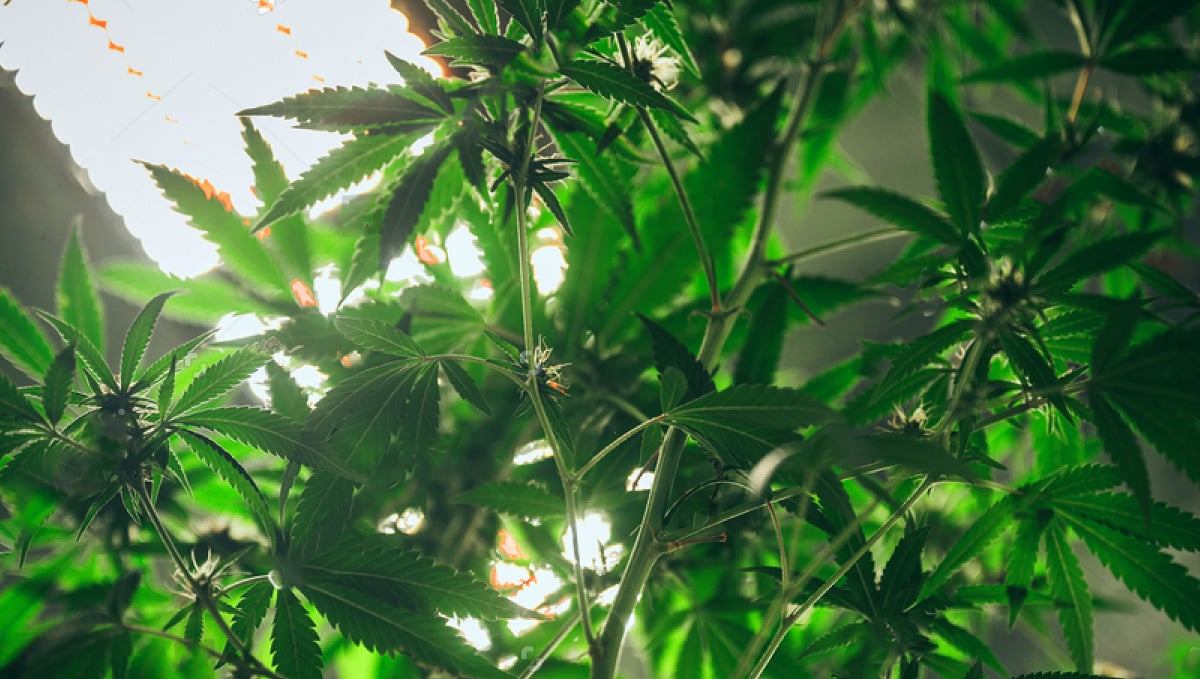
This is not really a tip but more of an advice: providing good lighting will allow your plant to develop to its maximum (the increased trichome production is a consequence). If you cheap out on the light, it will reflect on the quality of the buds and can result in less potent flowers. Not everyone can provide the best lights available but be sure to provide them with the best quality lights you can.
4. Adjusting The Environment For Each Stage
As your plant grows, it will start producing more and more trichomes, these tiny glands are extremely fragile and volatile. Because of this, we have to ensure our plants are growing in the proper environment (especially) in the flowering stage, where there's a higher production of trichomes.
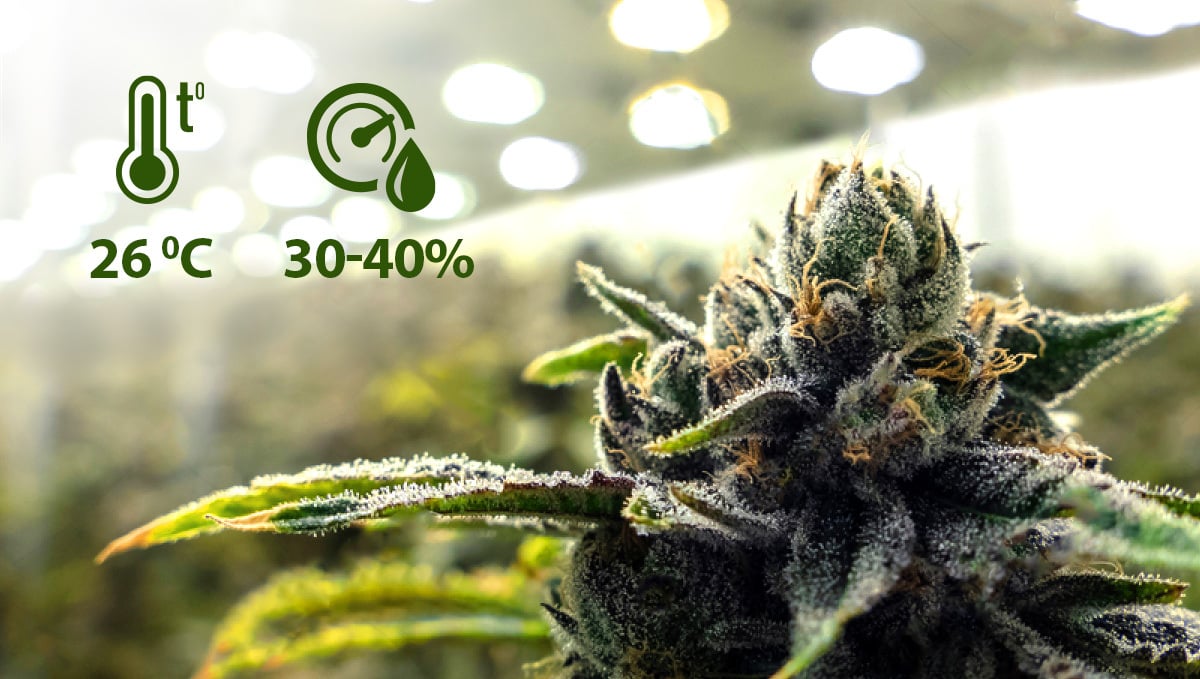
It is good to adjust our growing space to around 30-40% humidity and a temperature of around 26 celsius in the last 2-3 weeks before harvest. This will avoid the trichomes and terpenes from getting damaged or vaporized by heat and will result in an overall more potent effect and better-tasting flower.
Temperatures That Can Affect Trichomes
| Chemical Compound | Temperature | Effect |
|---|---|---|
| Terpenoids | 39°C (102°F) | Less volatile terpenoids start to evaporate. |
| THCA | 50°C (122°F) | THCA starts turning into THC due to decarboxylation. |
| CBD | 66°C (150°F) | CBD melts and starts to evaporate. |
Remember to flush your plants for up to 2 weeks before harvesting to really make the flavor stand out.
5. Plant Training
There are two types of plant training, low-stress training (LST) and high-stress training (HST). Both of them are effective methods to increase trichome production and the overall quality of our flowers. They consist of training our plants by applying force, either by tying down the branches or by cutting or mutilating the plant in very specific places to achieve a desired size or structure to allow a better air flow and the light to reach deeper. This helps us to better use our grow space, especially the lights and fans, and avoid the waste of electricity. Have in mind that plant training will not actually make the plant produce more trichomes but will allow her to reach its maximum production, the amount of resin will really depend on genetics.
6. Plant Supplements
There are a number of supplements intended for increasing trichome and terpene production, although they don’t do miracles, they will provide more of the nutrients your plant needs in the last weeks of the flowering stage. Some plants need more nutrients than others and sometimes what nutrient brands provide is not enough. Supplements can provide a more specific mix of macro and micronutrients for the final weeks of the flowering stage when the plant is producing more trichomes.
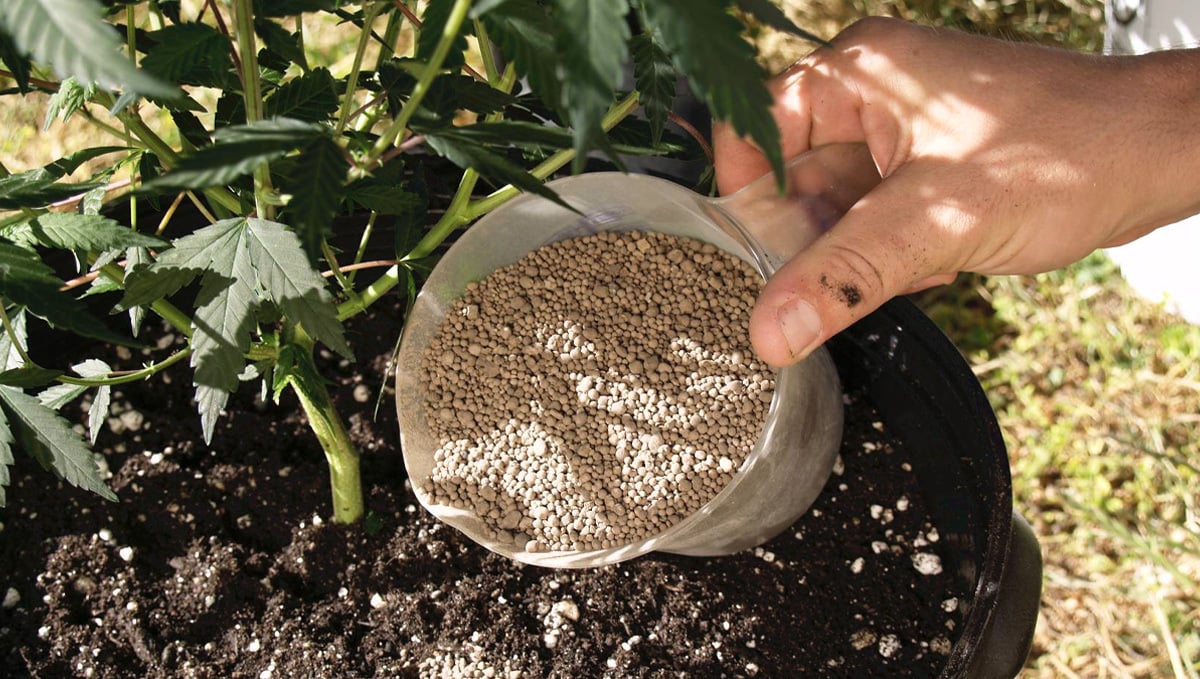
In this stage, our plant needs more potassium to develop buds properly. So most supplements will provide your plant with the exact amount it needs and some micronutrients will stimulate terpene and cannabinoid production. Now, remember you don’t need supplements to achieve this, you can simply provide the nutrients yourself by observing and providing what your plant needs.
7. Genetics
Choosing good genetics is the way to go if you want more resinous buds. By carefully choosing which genetics to grow and maybe spending a little bit more for seeds from a reputable vendor, you ensure you will grow something up to your expectations and won’t get disappointed after having wasted money, time, and growing pace.
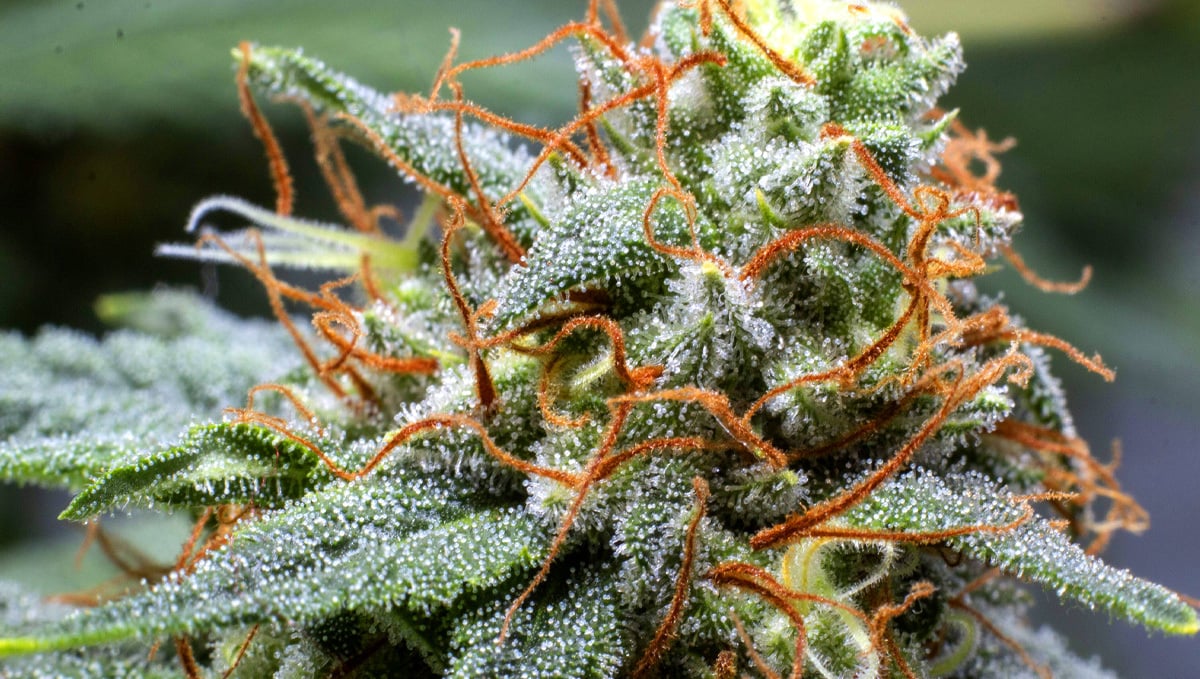
Always remember that even if you’re growing good quality genetics, you will need to provide it a good environment for it to develop properly. If you fail to do that, every plant you grow will not be up to your expectations.
8. Complete Darkness before harvest
Apart from everything mentioned before, there are other methods that can be used to boost trichome production such as leaving the plants in 1 or 2 days of complete darkness before harvest. It’s said that this method does not only increase trichome production but also improves flavor but there’s no scientific research on this so it’s a matter of trying and experimenting to see if it’s worth the effort. The only problem with this method is that the lack of light could increase the risk of mold, which is something you definitely do not want at the end of flowering. So make sure you have your exhaust fan ON and keep the growing conditions on point to avoid mold!
9. Drought Stress
Another unusual method used by some growers is to induce drought stress as it’s said that this can increase cannabinoids and terpenes production in cannabis flowers. Although you should be very careful as some strains can be more sensitive than others and could turn hermaphrodite or develop a couple of bananas if the drought stress is not controlled. Just like the other method, there isn’t much scientific research to back it up and it depends a lot on the specific cannabis strain and its ability to resist drought. In a study conducted a couple of years ago, cannabis plants that suffered from controlled drought stress showed a 50% increase in THC. But remember, it’s extremely important you first experiment before applying this method as it could have the opposite effect and cause your plants to turn hermie.
10. In Conclusion
When talking about increasing trichome production, there’s only much you can do. If you’re growing in an improvised growing space, these tips will be really helpful. But if you’re growing in a fairly good growing space and cannot get your plants to produce more resin, we recommend starting to look for better quality genetics.
Good genetics are those that will deliver what the vendor offers without too much hassle. If you’re tired of growing bad seeds, we recommend our new Gorilla Cookies Auto. This cultivar will not only be up to your expectations but will leave you amazed by its extremely resinous buds.








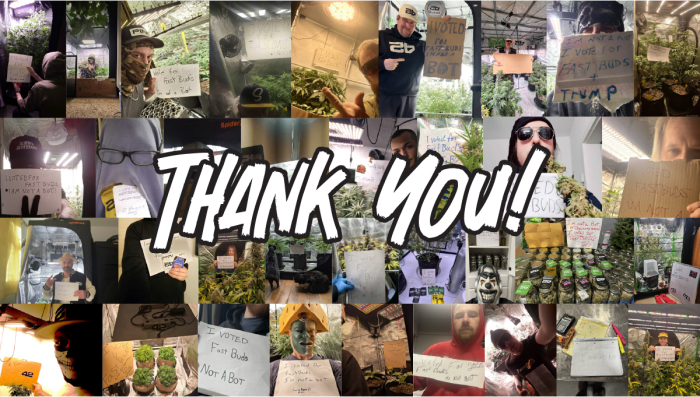
Comments